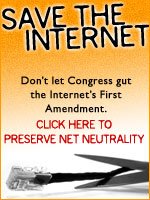
The Peoria (Ill.) Journal Star
May 8, 2006 Monday 12:21 PM EST
Editorial
HEADLINE: Telecom network a Web of confusion
The last major federal telecommunications act passed in 1996, back when Google was but a fledging research project. Suffice it to say, much has changed in online commerce and content. The Internet moves quickly. Congress, however, moves slowly - as in 30k dial-up modem slow. When the House finally does hunker down, it takes a powder on one of the Net's hottest debates. That would be "network neutrality," a vague term that belies a simple concept.
Proponents argue that Internet service providers (ISPs) shouldn't have a say in which Web sites surfers visit or how fast those sites load. Providers, such as SBC/AT&T, merely supply the network with which to access the Internet and must remain neutral over its speed and content. An amendment to the Communications Opportunity, Promotion and Enhancement Act delineating such a standard recently died in a House committee. That's an unfortunate failure; the Senate shouldn't hesitate to take up the matter in its own telecom bill.
Bloggers have been buzzing about the need for neutrality since SBC and BellSouth executives floated the idea of a "tiered" Internet. The companies hope, for instance, to charge Yahoo! so that its site loads faster than Google's, or to make rival Net-phone firms like Vonage pay to use their broadband pipes.
The first idea is akin to a gas station charging a Chevy driver more than a Honda driver. The latter is like AT&T putting static on your line when a Verizon customer calls. Neither is exactly competitive.
Without neutrality, there are other foreseeable effects. An ISP that sells music could make iTunes slow to a crawl. A big-box retailer could muscle out small guys by paying to have its site more accessible. Firms that use one company for Net access but another for online conferencing could witness speed disintegrate. Most disturbing is the threat to free speech. While ISPs maintain that they won't tinker with content, it may be hard to resist. Time Warner recently purged a mass e-mail critical of AOL, and a major Canadian Internet company prevented customers from visiting the site of its employee union. That's like a paperboy ripping out pages of a newspaper.
As telecoms merge and concentrate power, fewer companies will control access to the Internet. They are certainly entitled to make money. However, they want to move beyond charging subscribers and start charging Web sites simply for being online. Absent a neutrality standard, a few big companies could skew Net access beyond recognition.
Some of this can be so complex, especially for those not born in the computer age, that it can be difficult to wade through. But we all understand that competition is good. If America is entering the era of Internet regulation, it would be advisable if Congress erred on the side of competition and passed "network neutrality." Go ahead and Google it.
Reprinted with permission, The Peoria (Ill.) Journal Star.
Reading this article was an experience. I enjoyed all the information you provided and appreciated the work you did in getting it written. You really did a lot of research.
ReplyDelete